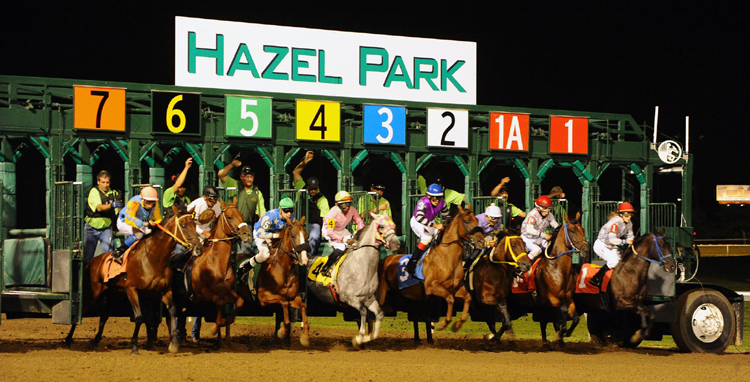The long-standing fight over how to divvy up revenue from horse race wagering between the two remaining horse tracks in Michigan may have finally found some resolution.
However, owners of Hazel Park Raceway, a thoroughbred racing track, and Northville Downs, a standard breed harness racing track, both agree that other areas of the business, namely introducing electronic racing to the tracks, needs to be addressed in order for the industry to be relevant in the current century and beyond.
Northville Downs’s executives say that the way Senate Bill 504 (pdf) was written still doesn’t give it a chance in passing, even after it was stripped of a controversial provision that would have permitted the tracks to have some Internet-based wagering. Responding to that, Hazel Park Raceway, located on the outskirts of Detroit, and its affiliate, the Howell-based Michigan Horsemen’s Benevolent and Protective Association, say they intend to request that online wagering is pursued by the Michigan Gaming Control Board as an administrative rule change and not in statute.
Advance deposit wagering would allow those wagering on simulcast races to do so from their tablets or cell phones without having to be present at a track. Currently, Michigan law requires that bets on horse racing be placed from within a track. Both tracks already consider what they do an extension of online betting, minus the paper plus the mobile device. Track owners believe that the introduction of online games by the Michigan Lottery is, in essence, the same thing. The issue is also a financial one considering that 95 percent of the revenue the tracks receive comes from bets placed on simulcast races, not live ones. That means they are competing with out-of-state mobile wagering sites that they don’t receive any proceeds from and that don’t pay state taxes.
An amendment to the state’s constitution in 2004 requires that any expansion of gaming must be done so via a statewide vote. The Gaming Control Board has yet to comment publicly on whether it’s considering the authorization of advance deposit wagering. After a 30-7 vote in the Senate last week is possible that this week the bill is heard in the House agriculture committee.
Sponsored by state Sen. David Robertson, Senate Bill 504 would be the first update to the 1995 Michigan horse racing statute. In addition to other things, the current formula that distributes revenue from wagers would be rewritten. Currently, the formula pools all of the wagers placed on simulcast races from both tracks into a common purse. It’s then divided between the horseman’s groups and the tracks. According to track owners, years ago when there were more horse tracks operating in Michigan, that formula made sense. However, lack of interest led to seven tracks closing since 1998, leaving just Hazel Park and Northville Downs. And even though the tracks race different breeds of horses, essentially they compete for the same audience and since the wagering pool has decreased have lost revenue.
Through the current formula, roughly 65 percent of the proceeds from the common purse go to the harness racing standard breeds, after a 3.5 percent state tax and winners are paid, with the remainder going to the thoroughbreds. The common purse would be eliminated through Robertson’s bill, opting instead for a “site-specific” model, which means that each track would keep wagers placed at their respective tracks.



